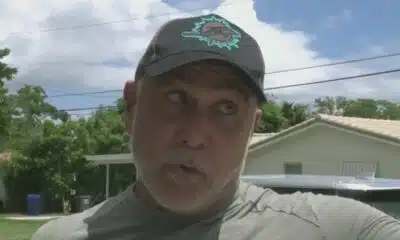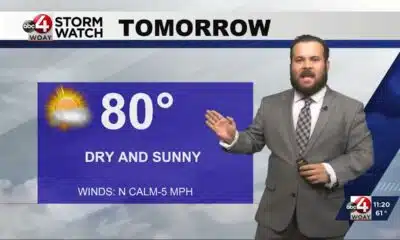News from the South - North Carolina News Feed
Former, current police chiefs speak out amid planned protests
SUMMARY: Raleigh Police Chief Rico Boyce and former Apex Police Chief Jason Armstrong spoke about upcoming protests amid ongoing immigration demonstrations. Boyce emphasized protecting demonstrators’ First Amendment rights while ensuring safety for all. Drawing on experience from 2020’s social justice protests, Boyce stressed his department’s capability to de-escalate situations and is preparing for all scenarios, learning from other cities’ successes and failures. Armstrong highlighted lessons learned from protests in Ferguson in 2014 and 2020, noting the complexity of crowds. Both chiefs encouraged peaceful protests, with Boyce affirming Raleigh remains a safe city throughout the demonstrations.
“That’s always our goal to make sure individuals can exercise their right peacefully as well as being safe,” Chief Boyce said.
Download: https://abc11.com/apps/
Like us on Facebook: https://www.facebook.com/ABC11/
Instagram: https://www.instagram.com/abc11_wtvd/
Threads: https://www.threads.net/@abc11_wtvd
TIKTOK: https://www.tiktok.com/@abc11_eyewitnessnews
News from the South - North Carolina News Feed
Family, friends hold candlelight vigil in honor of Giovanni Pelletier
SUMMARY: Family and friends held a candlelight vigil in Apex to honor Giovanni Pelletier, a Fuquay Varina High School graduate whose body was found last month in a Florida retention pond. Giovanni went missing while visiting family, after reportedly acting erratically and leaving his cousins’ car. Loved ones remembered his infectious smile, laughter, and loyal friendship, expressing how deeply he impacted their lives. His mother shared the family’s ongoing grief and search for answers as authorities continue investigating his death. Despite the sadness, the community’s support has provided comfort. A celebration of life mass is planned in Apex to further commemorate Giovanni’s memory.
“It’s good to know how loved someone is in their community.”
More: https://abc11.com/post/giovanni-pelletier-family-friends-hold-candlelight-vigil-honor-wake-teen-found-dead-florida/17811995/
Download: https://abc11.com/apps/
Like us on Facebook: https://www.facebook.com/ABC11/
Instagram: https://www.instagram.com/abc11_wtvd/
Threads: https://www.threads.net/@abc11_wtvd
TIKTOK: https://www.tiktok.com/@abc11_eyewitnessnews
News from the South - North Carolina News Feed
NC Courage wins 2-1 against Angel City FC
SUMMARY: The North Carolina Courage defeated Angel City FC 2-1 in Cary, ending their unbeaten streak. Monaca scored early at the 6th minute, followed by Bull City native Brianna Pinto’s goal at the 18th minute, securing a 2-0 halftime lead. Angel City intensified in the second half, scoring in the 88th minute, but the Courage held firm defensively to claim victory. Pinto expressed pride in the win, emphasizing the team’s unity and playoff ambitions. Nearly 8,000 fans attended. Coverage continues tonight at 11, alongside college football updates, including the Tar Heels vs. Richmond game live from Chapel Hill.
Saturday’s win was crucial for the Courage as the regular season starts to wind down.
https://abc11.com/post/north-carolina-courage-wins-2-1-angel-city-fc/17810234/
Download: https://abc11.com/apps/
Like us on Facebook: https://www.facebook.com/ABC11/
Instagram: https://www.instagram.com/abc11_wtvd/
Threads: https://www.threads.net/@abc11_wtvd
TIKTOK: https://www.tiktok.com/@abc11_eyewitnessnews
News from the South - North Carolina News Feed
Is nail gel actually harmful? It's complicated
SUMMARY: Gel nail polishes were recently banned in the EU due to the chemical TPO, which helps the gel harden under UV light. Concerns stem from studies showing potential reproductive risks in rats fed TPO, but humans aren’t exposed this way. The margin of exposure calculated for TPO is very high (1,515), suggesting it’s safe for people. More significant risks come from UV light used to cure nails, which may contribute to skin cancer over time. To stay safe, consider applying sunscreen before your salon visit and discuss toxin-free polish options with your aesthetician. Ultimately, balanced caution is key.
Certain gel nail polishes are no longer widespread in Europe as a chemical was banned due to potential health risks with long-term exposure. But a closer look at the study prompts some questions.
-
News from the South - Missouri News Feed6 days ago
1587 Prime gives first look at food, cocktail menu ahead of grand opening in KC
-
News from the South - Virginia News Feed7 days ago
On the record: Winsome Earle-Sears
-
News from the South - Arkansas News Feed6 days ago
‘One Pill Can Kill’ program aims to reduce opioid drug overdose
-
News from the South - West Virginia News Feed6 days ago
Protesters in D.C. flood the streets demanding an end to Trump’s military deployment
-
Mississippi News Video6 days ago
Interview: Come see Baptist at WTVA Senior Health Fair
-
News from the South - Alabama News Feed5 days ago
Alabama lawmaker revives bill to allow chaplains in public schools
-
The Conversation6 days ago
How is paint made?
-
News from the South - Arkansas News Feed5 days ago
Arkansas’s morning headlines | Sept. 9, 2025








































